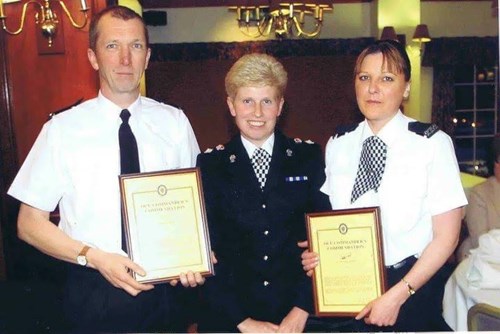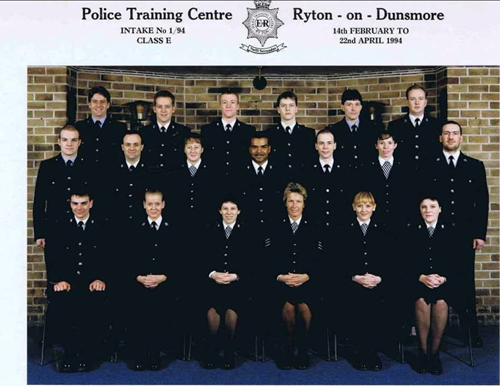“We’re just making the most of every day”
8 March 2022
“It has been such a tough decision, but the time is right. It is time to give my whole self to my family and for us to make the most of every day, creating memories together,” says Sharon Johnson, whose career at West Midlands Police began when she was 16.
After initially joining the police as part of the Youth Training Scheme as a teenager, Sharon enrolled as an officer just before her 23rd birthday in 1994. She was the only female officer on her shift and the uniform for women was strictly skirt or culottes. And, she was given a handbag, in which she carried her small truncheon – smaller than those her male colleagues were given - a pocketbook and sometimes, a flask of tea.

“Every time a female prisoner came in, or there was a case involving babies or children, people would ask me to deal with it,” Sharon recalls.
“There was a certain stigma surrounding me being a woman when in actual fact there were dads working who would be able to handle those jobs better.
“Now, in some cases, the majority of those on shift are women – things have changed drastically. You couldn’t even imagine the Force being how it was then, now.”
As the youngest officer and the only female, Sharon was also expected to get into work early and make the cups of tea for her colleagues.
“When I joined, it was unheard of to have a female sergeant or female inspector. It seems mad now looking back at how things were, but that’s just the way it was,” she said, “I personally, have never faced any challenges and I think people are a lot more open to women working in the Force now.”
Sharon remembers having to carry around a folder with her on every shift, in which she would have crime reports, her road traffic collision book, death reports – the lot.
“Everything was paper back then, writing everything down would take a long time. And then we’d have to re-write everything again and again, but that was the norm back then. Now we all communicate digitally and log everything on a computer,” explained mother-of-two Sharon.
“Now officers go out with a camera and hand-held device, no folder. The Force has evolved so much.”
Being in the police was something she always wanted to do, although as a youngster, that was probably due to the uniform, admits Sharon.

Sharon is pictured far right on the front row of this class photo.
“I always wanted to do it and if I say I’ll do something, I will do it,” she said.
Over the past 30 years, Sharon has worked within a number of departments, including the response team, which she says is where some of her best memories at work are.
“I love not knowing what you’re going to do, day to day,” added Sharon, who says there’s no better feeling than getting justice for victims by helping to put offenders in prison.
“I worked a lot on sexual offence and child abuse cases, which was very emotionally hard but also so rewarding – to see the relief on those victims’ faces to know that the offenders had been sentenced.”
Around six years ago, Sharon moved to the investigation team, in which she spent two years.
“I was then given the opportunity to start in a completely new team, the initial investigation department. I was one of 30 originals and now that team has grown to around 250. And that’s the role I will be leaving,” explained Sharon.
“I really will miss the job but I have done everything I want to do, and this is the best decision for both me and my family right now.”
Having dedicated three decades to protecting the public, Sharon is retiring to spend time supporting her husband of 20 years, former West Midlands Assistant Chief Constable, Chris.
“I met Chris on the job back in 1996 and we married in 2001,” said Sharon. The couple have a 17-year-old daughter and 11-year-old son.
In 2018, having experienced ongoing shortness of breath, Chris was given the devastating news that he had Motor Neurone Disease (MND), a terminal illness that affects the brain and nerves, causing a person’s muscles to get gradually weaker.
He had been promoted to the position of Assistant Chief Constable shortly before receiving the diagnosis.
“It was 16th November 2018, that date is etched in my memory. My whole world fell apart,” says Sharon.
“It’s been incredibly tough, and very emotional. When I was first told the news, I just cried. It’s the small things I miss, like when I see a couple walking up the road together holding hands – it reminds me, we can’t do that anymore.”
After being diagnosed, Chris, who is now 54, used his position to create awareness around diversity in the Force. He continued to work up until September 2020, which is when deterioration in his condition forced him to retire.
He was also part of the United To End MND campaign, which successfully called on the Government to invest £50 million in targeted MND research.
Sharon said: “Chris knows that’s probably too late for that money to impact his life but being part of that campaign enabled him to leave his own legacy. He knows he’s done his bit.”
Chris is in a wheelchair, needs a permanent ventilator and cannot move from his neck down. He is unable to feed himself, wash, eat or brush his teeth.
“His body is failing, and it’s heartbreaking to watch,” says Sharon, “But he can still talk to me, which I take a lot of comfort in.”
On the back of her husband’s illness, Sharon discovered a new love for running, which led to her taking part in the Liverpool Rock ‘n’ Roll Marathon and fundraising for the Motor Neurone Disease Association (MNDA), along with the Primrose Hospice, a local charity that has supported the family since Chris’ diagnosis.
Thanks to her fundraising efforts, Sharon, along with fellow officers and police staff have helped raise £61,000 for charity. This year, her passion for running and raising money continues, as she has a place in the Great North Run and the London Marathon.
How does she do it? A question Sharon is asked regularly. Her response is always: “I’ve got two children and I have a responsibility to keep life as normal as possible for them.
“When Chris was diagnosed, we agreed that we would never cry in front of one another. But I have some amazing friends who I know I can ring up and talk to whenever I need.”
Sharon also receives regular counselling sessions from Primrose Hospice, a charity that she is now an official ambassador for.
“We know time is limited for Chris,” added Sharon. “So, we’re just making the most of every day.
“When you’re diagnosed with MND, you are told you have 60 per cent chance of being here within two years. Now, nearly four years later and Chris is still here, and he’s still talking.”
Sharon says both she and Chris have just great memories from the Force and have met some amazing friends. She added: “It will be a sad day when I retire but as we know, life doesn’t always plan out how you thought it would.”




















